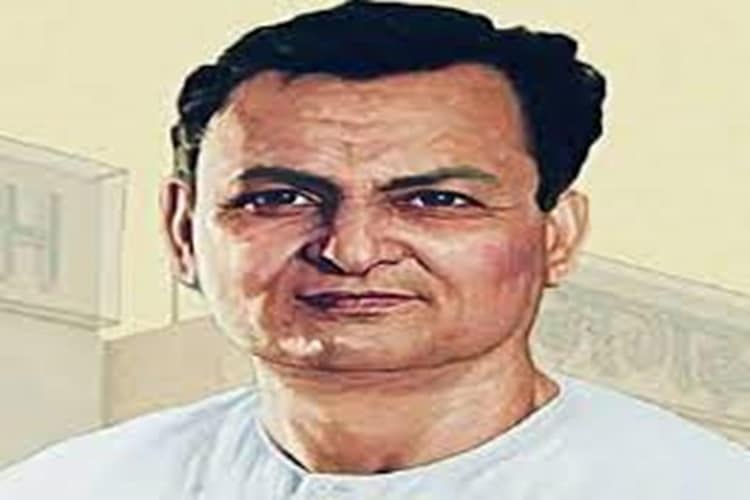Celebrating life and legacy of Rahul Sankrityayan

Rahul Sankrityayan (9 April 1893 – 14 April 1963) was an Indian writer and a polyglot who wrote in Bhojpuri and Hindi.
Life and Career
Rahul Sankrityayan was born as Kedarnath Pandey on 9 April 1893 in Azamgarh, Uttar Pradesh. He learned over 30 languages and wrote about 150 books on various subjects, such as history, culture, philosophy, religion, and literature. He is considered the father of Indian travel literature and a pioneer of modern Hindi prose.
He joined the Home Rule League in 1916 and participated in the Non-Cooperation Movement, the Civil Disobedience Movement, and the Quit India Movement. He was arrested and jailed several times by the British. He was one of the founding members of the Congress Socialist Party in 1934 and later joined the Praja Socialist Party. He advocated for democratic socialism, peasant rights, and secularism.
He received the Sahitya Akademi Award in Hindi in 1958 for his book Volga se Ganga, which is a collection of historical stories from the 6th century BC to the 19th century AD. The book traces the migration of Aryans from the Eurasian steppes to the Indian subcontinent and reflects his journey from the Volga River in Russia to the Ganga River in India. The book is widely acclaimed as a masterpiece of Hindi literature and has been translated into many languages.
He died on 14 April 1963 in Darjeeling.
Notable Works
Rahul Sankrityayan, also known as the “father of Hindi travel literature”, was an Indian author, essayist, playwright, historian, and scholar of Buddhism who wrote in Hindi and Bhojpuri. Here are some of his notable works:
- Volga Se Ganga: A travelogue that traces the cultural and historical roots of India.
- Madhya Asia Ka Itihas: A two-volume history of Central Asia, for which he was awarded the 1958 Sahitya Akademi Award.
- Meri Jeevan Yatra: His autobiography, published in three volumes.
- Ghumakkad Shastra: Another one of his important travelogues.
- Tibbati Bal-Siksha, Pathavali: A three-volume work related to Tibet.
- Tibbati Vyakaran: A Tibetan grammar book.
- Tibbat May Budh Dharm: A book on Buddhism in Tibet.
- Lhasa ki and Himalaya Parichay: Two-part introduction to Lhasa and the Himalayas.
- Teen Natak and Panch Natak: His plays in Bhojpuri.
Sankrityayan’s collection of works spans more than 100 books on various subjects like Indology, Communism, Buddhism, and philology, as well as various short stories, novels, and plays. He was awarded the Padma Bhushan, the country’s third-highest civilian award in 1963.
Award and Legacy
He received the Sahitya Akademi Award in Hindi in 1958 for his book Volga se Ganga, which is a collection of historical stories from the 6th century BC to the 19th century AD1 His legacy is that of a genius who enriched the fields of literature, culture, and politics with his original and insightful contributions. He was also a freedom fighter, a socialist leader, and a polyglot who learned over 30 languages.
He was awarded the Padma Bhushan in his lifetime and the Indian government issued a postage stamp to commemorate his birth centenary in 1993.
FAQ on Rahul Sankrityayan
- Who was Rahul Sankrityayan?Rahul Sankrityayan, originally named Kedarnath Pandey, was a prominent Indian scholar, writer, and polyglot. He is widely regarded as one of the most influential figures in modern Indian literature and intellectual discourse.
- What were Rahul Sankrityayan’s major contributions?Sankrityayan made significant contributions to various fields such as literature, linguistics, history, and Buddhist studies. He authored over a hundred books, including scholarly works, novels, essays, and travelogues. His translations and writings played a crucial role in popularizing Buddhism in India and abroad.
- What is Rahul Sankrityayan best known for?Sankrityayan is best known for his scholarly works on Buddhism and his extensive travels across India and other countries. His travelogues, particularly those documenting his journeys to Central Asia and Tibet, are highly acclaimed for their insights into different cultures, languages, and historical landscapes.
- When did Rahul Sankrityayan live?Rahul Sankrityayan was born on April 9, 1893, and passed away on April 14, 1963. He lived during a pivotal period in Indian history marked by significant social, political, and cultural transformations.
- What languages did Rahul Sankrityayan know?Sankrityayan was a polyglot who had a remarkable command over several languages, including Sanskrit, Pali, Prakrit, Hindi, Urdu, Tibetan, Russian, French, German, and English. His linguistic proficiency enabled him to translate and interpret numerous ancient texts and literary works.
- What was Rahul Sankrityayan’s educational background?Sankrityayan had a diverse educational background. Despite facing financial constraints, he pursued his studies with great determination and earned degrees in various disciplines, including Sanskrit, Persian, and English literature.
- How did Rahul Sankrityayan contribute to Indian literature?Sankrityayan’s literary works encompassed a wide range of genres, including fiction, poetry, essays, and biographies. He infused his writings with elements of social realism, satire, and philosophical insights, addressing contemporary issues while drawing inspiration from India’s rich cultural heritage and intellectual traditions.
- What was Rahul Sankrityayan’s stance on social and political issues?Sankrityayan was deeply committed to social justice, equality, and humanism. He actively participated in various social and political movements, advocating for the rights of marginalized communities, promoting secularism, and fostering intercultural dialogue and understanding.
- How is Rahul Sankrityayan remembered today?Rahul Sankrityayan’s legacy continues to inspire scholars, writers, and activists across India and beyond. He is celebrated for his intellectual curiosity, pioneering research, and passionate advocacy for cultural and linguistic diversity, making him a revered figure in the pantheon of Indian literature and thought.
Observer Voice is the one stop site for National, International news, Sports, Editor’s Choice, Art/culture contents, Quotes and much more. We also cover historical contents. Historical contents includes World History, Indian History, and what happened today. The website also covers Entertainment across the India and World.
Follow Us on Twitter, Instagram, Facebook, & LinkedIn

